
James Tyler Kent (1849–1916) was an American physician best remembered as a forefather of modern homeopathy. In 1897 Kent published a massive guidebook on human physical and mental disease symptoms and their associated homeopathic preparations entitled Repertory of the Homeopathic Materia Medica, which has been translated into a number of languages. It has been the blueprint to many modern repertories used throughout the world and even remains in use by some homeopathic practitioners today.

Pedanius Dioscorides, "the father of pharmacognosy", was a Greek physician, pharmacologist, botanist, and author of De materia medica —a 5-volume Greek encyclopedia about herbal medicine and related medicinal substances, that was widely read for more than 1,500 years. For almost two millennia Dioscorides was regarded as the most prominent writer on plants and plant drugs.
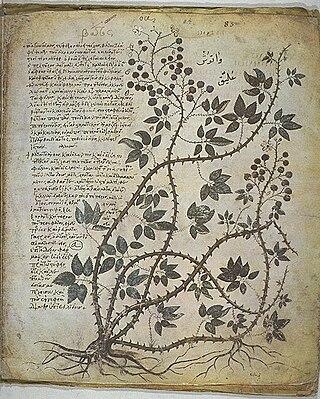
Materia medica is a Latin term from the history of pharmacy for the body of collected knowledge about the therapeutic properties of any substance used for healing. The term derives from the title of a work by the Ancient Greek physician Pedanius Dioscorides in the 1st century AD, De materia medica, 'On medical material'.
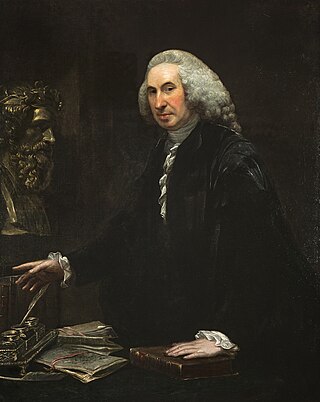
William Cullen was a Scottish physician, chemist and agriculturalist, and professor at the Edinburgh Medical School. Cullen was a central figure in the Scottish Enlightenment: He was David Hume's physician, and was friends with Joseph Black, Henry Home, Adam Ferguson, John Millar, and Adam Smith, among others.
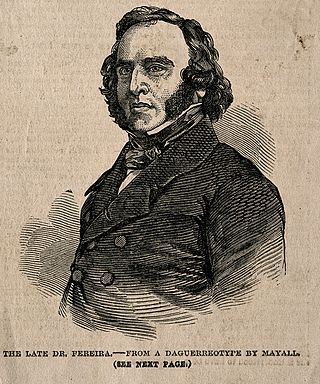
Jonathan Pereira FRS was a pharmacologist, author of the Elements of Materia Medica, a standard work. He was examiner on the subject in the University of London.
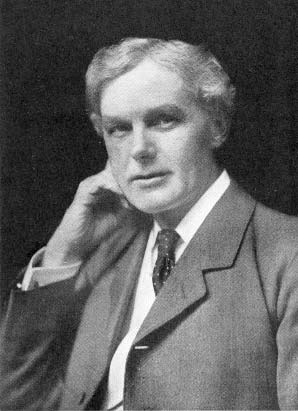
John Henry Clarke was an English classical homeopath. He was also, arguably, the highest profile anti-Semite of his era in Great Britain. He led The Britons, an anti-Semitic organisation. Educated at the University of Edinburgh, he received his medical degree in 1877.

Harvey Wickes Felter (1865–1927) was an eclectic medicine doctor and author of Eclectic Materia Medica. He was co-author, with John Uri Lloyd, of King's American Dispensatory.
Eclectic Materia Medica is a materia medica written by the eclectic medicine doctor Harvey Wickes Felter. This was the last, articulate, but in the end, futile attempt to stem the tide of Standard Practice Medicine, the antithesis of the model of the rural primary care "vitalist" physician that was the basis for Eclectic medicine. The herbal portions of the Materia Medica can be found at the websites below, but the book also contained alkaloids, salts, chemicals, injected compounds and other products well-outside of the herbal realm.

Finley Ellingwood was an American doctor of eclectic medicine who was the author of the influential American Materia Medica, therapeutics, and pharmacognosy in 1919. Ellingwood was an active Chicago physician with many years experience, and an acknowledged expert in obstetrical/gynecological medicine. He was a vocal advocate of women physicians, and edited Ellingwood's Therapeutist for many years. His brand of Eclectic Medicine differed from the more subdued Cincinnati style as mentored by Scudder, Lloyd, Fyfe, and Felter.

John Milton Scudder was an American physician and practitioner of eclectic medicine. He was a Swedenborgian by faith.
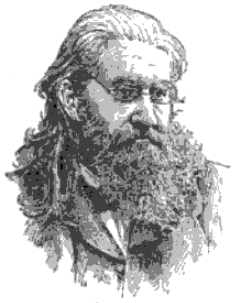
Constantine J. Hering was a physician who was an early pioneer of homeopathy in the United States.

Sir William Whitla was an Irish physician and politician.
Eclectic medicine was a branch of American medicine that made use of botanical remedies along with other substances and physical therapy practices, popular in the latter half of the 19th and first half of the 20th centuries.
Charles Julius Hempel was a German-born translator and homeopathic physician who worked in the United States.

Horatio Curtis Wood Jr. was an American physician and biologist. Born into a wealthy Pennsylvania family, he attended the Medical Department of the University of Pennsylvania, and after serving as a surgeon in the American Civil War, continued to teach at the University. A member of the National Academy of Sciences, he was known for his 1874 text Treatise on Therapeutics, which became a widely used medical textbook, and also for his botanical and zoological work: writing on freshwater algae, fossil plants, arachnids, and myriapods.

Alcinous Burton Jamison was an American physician, inventor of medical devices, socialite, and occultist.
Philo Judson Farnsworth was a United States physician who worked in Iowa.

Joseph Carson was a United States physician and medical botanist.
Robert Edmund Scoresby-Jackson FRSE FRCPE FRCSE (1833–1867) was a short-lived but influential British physician and historian. He specialised in the effects of climate upon health.

Timothy Field Allen was an American physician and botanist.















